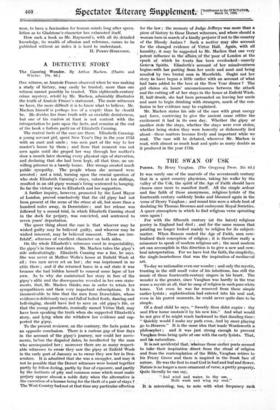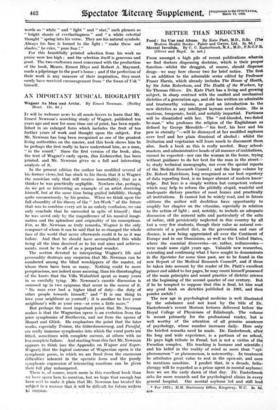THE SWAN. OF USK
IT was surely one of the marvels of the seventeenth century, that in a quiet country physician, -taking his walks by the valley of the Usk, the spirit' of_the Age of Faith should have chosen once more to manifest itself. All the simple ardour and fine faith of those anonymous, religious lyrists of the, fourteenth century suddenly broke and bloomed again in the verse of Henry Vaughan ; and round him were a whole host of dotibting Sir Thomas Brownes and embryonic Royal Societies. A queer atmosphere in which to find religious verse sprouting
once again I •
For with .the fifteenth century (at the latest) religious poetry in England had died ; _ and for the same reason that painting no longer looked mainly to religion for its subject- matter. When Reason ousted the Age of Faith, men sere- brazed their conception of religion ; it is therefore really a misnomer to speak of modern religious art ; the most modern art can accomplish in this direction is to give a new and cere- bral interpretation. For we have lost the faith, the simplicity, the single-heartedness that was the inspiration of mediaeval art.
To-day we rationalize even our wonder ; and only the mystic, trusting in the still small voice of his -intuitions, has still the music of those fourteenth-century singers in his heart. The wonder is the greater, since Vaughan was hardly in the true sense a mystic at all, that he sang of religion in such pure white tones. Yet even he was far removed from these simple earlier lyrists ; sophistication had entered into his soul and, even in his purest moments, he could never quite dare to be simple.
Of a dead child he says, " Sweetly thou didst expire : thy soul. Flew home unstain'd by his new kin." And what would he not give if he might reach backward to that dazzling time : " Quickly would I make my path even, And by meer playing go to:Heaven." It is the same- idea that made Wordsworth Er philosopher ; and it was just strong enough to prevent Vaughan from being quite at one with the early lyrists. That,
and his naturalism. . - - .
It isnot accidental that, whereas those earlier poets seemed to take- their inspiration direct- from the ritual of- religion and from the contemplation of the Bible, Vaughan retires to his Priory Grove and there is inspired in the frank face of nature. He was the first to read God in bud and leaf and flower. Nature is no longer a mere ornament of verse, a pretty property. Quite literally he can say, " And wind and water, to thy. use,
Both wash and wing my soul."
It is interesting, too, to note with what- frequency such
words as " white " and " light " and " star," such phrases as " bright shoots of everlastingness " and " a white celestial thought ". spring into his verse. They are his natural symbols. Always his face is turned to the light : " make these sad_ shades," he cries, " pure Sun I" For this beautifully printed selection from his work no praise were too-high ; and the selection itself is generous and good. The two craftsmen most concerned with the production of the book, Messrs. Ernest Rhys and. Robert A. Maynard, made a pilgrimage to the poet's home ; and if the perfection of their work is any measure of their inspiration, they must surely have received encouragement from " the Swan of Usk " himself.































































 Previous page
Previous page